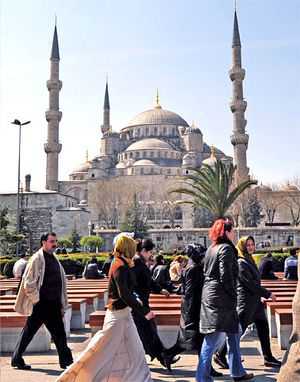By SEBNEM ARSU
ISTANBUL — The suicide bomber who attacked a police unit in the heart of Istanbul on Sunday had ties to the separatist Kurdistan Workers’ Party, the Istanbul governor’s office said Tuesday.
The 24-year-old bomber, who wounded 32 people and killed himself, struck on the last day of a unilateral, two-month cease-fire by the rebel group, known by the initials P.K.K.
There was no immediate response from the organization, which had earlier emphatically denied having anything to do with the bombing and declared an eight-month extension of its cease-fire.
The bomber, Vedat Acar, born in Van, a predominantly Kurdish town in southeastern Turkey, had joined the outlawed group in 2004, the governor’s statement said.
NTV, a private television network, reported that Mr. Acar had entered the country in August through a security post on the Iraqi border, where the P.K.K. has had a base for decades.
The bomb exploded Sunday morning in Istanbul’s busiest plaza, Taksim Square, wounding 15 police officers and 17 civilians.
Some senior members of the P.K.K., including Abdullah Ocalan, the group’s jailed leader, have been urging a political solution to the Kurdish conflict, which has claimed more than 40,000 lives since the early 1980s.
Turkish nationalists, however, regard the political steps suggested by the P.K.K., like the start of official dialogue with Mr. Ocalan and constitutional recognition of Kurdish identity, as a threat to Turkey’s unity.
Some Kurdish analysts who favor a peaceful resolution to the conflict consider attacks like the one on Sunday to be efforts to derail political progress.
“This attack came at a time when more effective, prominent circles were prepared to promote a democratic solution to the Kurdish issue at large,” said Umit Firat, a Kurdish intellectual. “Neither the state, the military, nor the people yield to such provocations anymore. Our nation knows about such dirty tactics well by now.”
The government, led by the Justice and Development Party, has passed legislation improving the cultural rights of Kurds and offering them political recognition.
For decades starting in the 1930s, Turkey tried to enforce a policy of absorbing the Kurds, the nation’s largest minority — now more than 12 million people out of a population of 78 million — into a greater Turkish identity.
The government, however, remains reluctant to introduce the Kurdish language in public schools and refuses to offer a general amnesty for fighters based in the mountainous regions of northern Iraq.
Turkey’s aspiration to become a full-fledged member of the European Union has been the strongest driving force behind granting greater rights to the Kurds.
Still, the union has denounced violence by the P.K.K., and many countries, including the United States, regard the group as a terrorist organization.
A version of this article appeared in print on November 4, 2010, on page A7 of the New York edition.
via Turkey Links Suicide Bomber to Kurdish Group – NYTimes.com.


Leave a Reply